The IMF made the steepest cut to its global-growth outlook in three years, with diminished expectations almost everywhere except the US more than offsetting the boost to expansion from lower oil prices.
The world economy would grow 3.5 percent this year, down from the 3.8 percent pace projected in October, the IMF said in its quarterly global outlook released late on Monday.
The Washington-based lender also cut its estimate for growth next year to 3.7 percent, compared with 4 percent in October.

Photo: EPA
The weakness, along with prolonged below-target inflation, is challenging policymakers across Europe and Asia to come up with fresh ways to stimulate demand more than six years after the global financial crisis.
Central bankers and government officials, including Bank of England Governor Mark Carney and Bank of Japan Governor Haruhiko Kuroda might talk about options when they convene this week at the World Economic Forum’s annual meeting in Davos, Switzerland.
“The world economy is facing strong and complex cross currents,” IMF chief economist Olivier Blanchard said in the text of remarks at a press briefing yesterday in Beijing. “On the one hand, major economies are benefiting from the decline in the price of oil. On the other, in many parts of the world, lower long-run prospects adversely affect demand, resulting in a strong undertow.”
The IMF cut its outlook for consumer-price gains in advanced economies almost in half to 1 percent for this year. Developing economies would see inflation this year of 5.7 percent, a 0.1 percentage point markup from October’s projections, the fund said.
The growth forecast reduction was the biggest since January 2012, when the fund lowered its estimate for expansion that year to 3.3 percent from 4 percent amid forecasts of a recession in Europe.
The IMF marked down estimates for this year for places including the eurozone, Japan, China and Latin America. The deepest reductions were in places suffering from crises, such as Russia, or for oil exporters, including Saudi Arabia.
IMF Managing Director Christine Lagarde outlined the sobering outlook in her first speech of the year last week, saying that oil prices and US growth “are not a cure for deep-seated weaknesses elsewhere.”
The US is the exception. The IMF upgraded its forecast for the world’s largest economy to 3.6 percent growth for this year, up from 3.1 percent in October.
Cheap oil, more moderate fiscal tightening and still-loose monetary policy would offset the effects of a gradual increase in interest rates and the curb on exports from a stronger dollar, the fund said.
In Europe, weaker investment would overshadow the benefits of low oil prices, a cheaper currency and the European Central Bank’s anticipated move to expand monetary stimulus by buying sovereign bonds, the IMF said.
The fund lowered its forecast for the 19-nation eurozone to 1.2 percent this year, down from 1.3 percent in October.
The ECB should go “all in” in its bond-buying program, Blanchard said in an interview with Bloomberg TV.
“We want to make sure that when there’s an announcement, that it’s as large as what the market’s expecting,” he said.
The IMF also trimmed its estimate for China’s growth to 6.8 percent, down 0.3 percentage point from October.

SEMICONDUCTORS: The German laser and plasma generator company will expand its local services as its specialized offerings support Taiwan’s semiconductor industries Trumpf SE + Co KG, a global leader in supplying laser technology and plasma generators used in chip production, is expanding its investments in Taiwan in an effort to deeply integrate into the global semiconductor supply chain in the pursuit of growth. The company, headquartered in Ditzingen, Germany, has invested significantly in a newly inaugurated regional technical center for plasma generators in Taoyuan, its latest expansion in Taiwan after being engaged in various industries for more than 25 years. The center, the first of its kind Trumpf built outside Germany, aims to serve customers from Taiwan, Japan, Southeast Asia and South Korea,

Gasoline and diesel prices at domestic fuel stations are to fall NT$0.2 per liter this week, down for a second consecutive week, CPC Corp, Taiwan (台灣中油) and Formosa Petrochemical Corp (台塑石化) announced yesterday. Effective today, gasoline prices at CPC and Formosa stations are to drop to NT$26.4, NT$27.9 and NT$29.9 per liter for 92, 95 and 98-octane unleaded gasoline respectively, the companies said in separate statements. The price of premium diesel is to fall to NT$24.8 per liter at CPC stations and NT$24.6 at Formosa pumps, they said. The price adjustments came even as international crude oil prices rose last week, as traders

SIZE MATTERS: TSMC started phasing out 8-inch wafer production last year, while Samsung is more aggressively retiring 8-inch capacity, TrendForce said Chipmakers are expected to raise prices of 8-inch wafers by up to 20 percent this year on concern over supply constraints as major contract chipmakers Taiwan Semiconductor Manufacturing Co (TSMC, 台積電) and Samsung Electronics Co gradually retire less advanced wafer capacity, TrendForce Corp (集邦科技) said yesterday. It is the first significant across-the-board price hike since a global semiconductor correction in 2023, the Taipei-based market researcher said in a report. Global 8-inch wafer capacity slid 0.3 percent year-on-year last year, although 8-inch wafer prices still hovered at relatively stable levels throughout the year, TrendForce said. The downward trend is expected to continue this year,

Taiwan Semiconductor Manufacturing Co (TSMC, 台積電), which supplies advanced chips to Nvidia Corp and Apple Inc, yesterday reported NT$1.046 trillion (US$33.1 billion) in revenue for last quarter, driven by constantly strong demand for artificial intelligence (AI) chips, falling in the upper end of its forecast. Based on TSMC’s financial guidance, revenue would expand about 22 percent sequentially to the range from US$32.2 billion to US$33.4 billion during the final quarter of 2024, it told investors in October last year. Last year in total, revenue jumped 31.61 percent to NT$3.81 trillion, compared with NT$2.89 trillion generated in the year before, according to